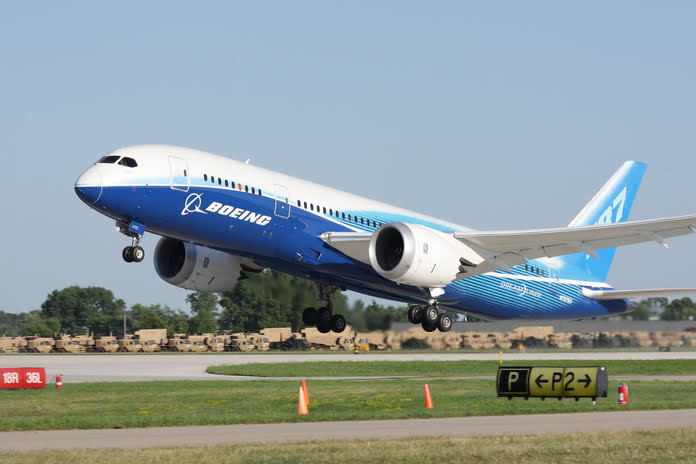CEO Dave Calhoun told Aviation Week in an interview on Thursday that Boeing (NYSE:BA) has not ruled out scrapping the 737 MAX 10 if Congress fails to extend a year-end deadline that would necessitate modifications to the aircraft’s crew alerting system and necessitate separate pilot training. To avoid having to comply with the new regulations under a 2020 law that was implemented as part of broader regulatory reforms at the Federal Aviation Administration following the deadly 737 MAX crashes in 2018 and 2019, Boeing (NYSE:BA) has until the end of December to secure approval for the popular plane.
The Engine Indicating and Crew Alerting System, or EICAS, is absent from the Boeing (NYSE:BA) 737 in contrast to other Boeing (BA) aircrafts. The CEO reportedly stated, “Our case is persuasive enough… This is a risk I’m willing to take,” adding that he does not anticipate canceling the flight but that “it’s simply a risk.” According to the source, 17 airlines have placed orders for more than 640 MAX 10 aircraft with Boeing (BA).
Mr. Calhoun (President and CEO of The Boeing Company) stated in an interview with Aviation Week magazine that he still anticipated a positive conclusion because Boeing intended to advocate for itself before the US Federal Aviation Administration (FAA) and the US Congress. He further said that, “if you go through the things we’ve been through, the debts that we’ve had to accumulate, our ability to respond or willingness to see things through, even a world without the [737 Max] 10 is not that dangerous.”
A Boeing spokesperson confirmed Mr. Calhoun’s comments to the BBC. The spokesman continued by saying “the business was dedicated to complying with regulatory standards and those of our clients to approve and deliver the 737-10. Safety continues to be the primary concern in our effort.” The FAA forewarned Boeing earlier this year that it might not be able to get the Max 10 certified by the end of the year. Before starting operations, an airline must be certified.
If Boeing (NYSE:BA) doesn’t receive clearance, laws that take effect in 2023 would require Boeing to install an alerting system in the Max 10s’ cockpits. A waiver from the US Congress would be required otherwise. According to the BBC, adding the system would require Boeing to reconfigure the Max 10’s flight deck and instruct pilots on how to fly in a different configuration.
The US regulations were put in place as a result of crashes involving other 737 Max aircraft that resulted in 346 fatalities in Ethiopia and Indonesia. After the 2019 tragedy involving Ethiopian Airlines, the whole worldwide 737 Max fleet was grounded. Since then, authorities all over the world have permitted planes to resume flight.
About Boeing
The Boeing Company (NYSE:BA) is an American multinational corporation that develops, produces, and markets aircraft, helicopters, rockets, satellites, telecommunications gear, and missiles on a global scale. Additionally, the business offers leasing and customer support services. According to 2020 revenue, Boeing is the third-largest defense contractor in the world and the largest exporter of goods from the United States. Boeing is one of the biggest aerospace producers in the world. [8] The Dow Jones Industrial Average includes Boeing stock. Delaware is where Boeing is incorporated.
About Boeing 737 MAX
The fourth generation of the Boeing 737 is the Boeing 737 MAX, a narrow-body airliner produced by Boeing Commercial Airplanes (BCA), a subsidiary of the American firm Boeing (NYSE:BA). It replaces the Boeing 737 Next Generation (NG) and is in direct competition with the Airbus A320neo lineup. On August 30, 2011, the new series was revealed. The Federal Aviation Administration (FAA) of the United States granted its certification in March 2017 after its inaugural flight on January 29, 2016. A-MAX 8 was delivered to Malindo Air as the first one in May 2017, and on May 22 of that year, service with Malindo Air began.
The 737 MAX is based on older 737 designs but has been given new airframes, more effective CFM International LEAP-1B engines, and distinctive split-tip winglets. With four available variations, the 737 MAX series has a range of 3,300 to 3,850 nautical miles and seats 138 to 204 passengers in a standard two-class configuration (6,110 to 7,130 km). It is planned that the 737-700, -800, and -900 will be replaced by the 737 MAX 7, MAX 8, and MAX 9, respectively. A longer 737 MAX 10 is also available. There are 4,094 unfulfilled orders for the 737 MAX as of May 2022, and 797 deliveries.
Featured Image: Megapixl @ Gk6mt















